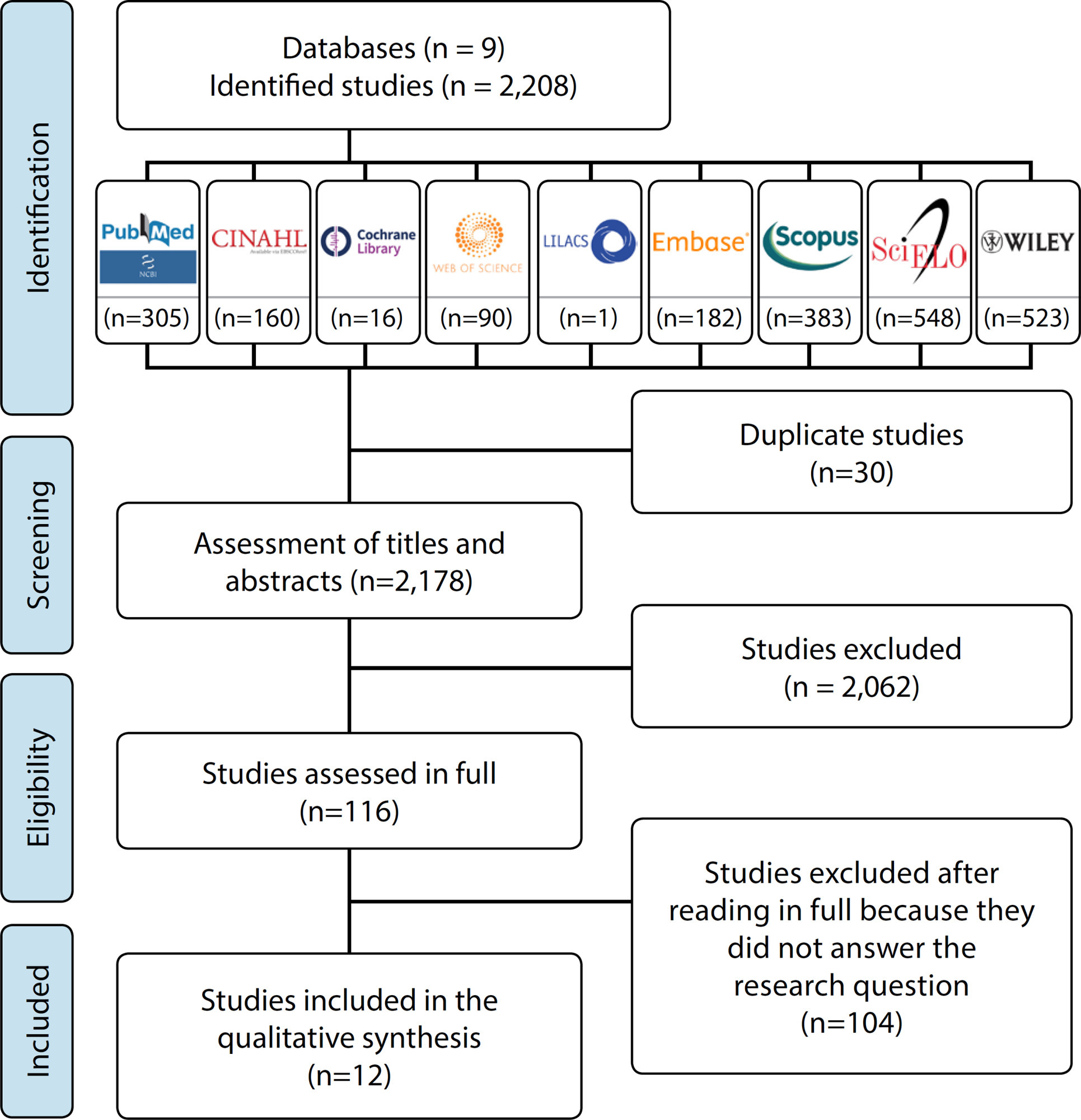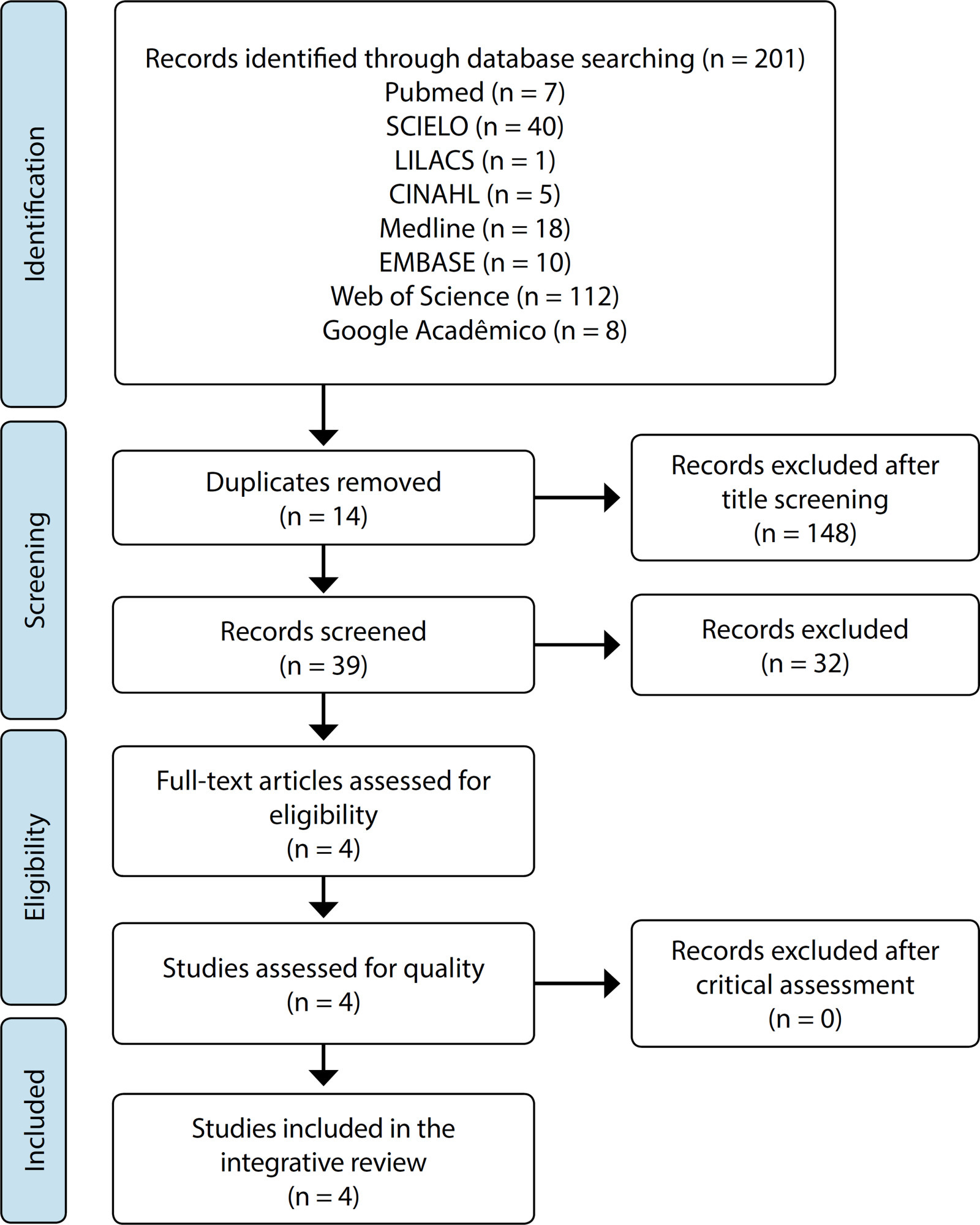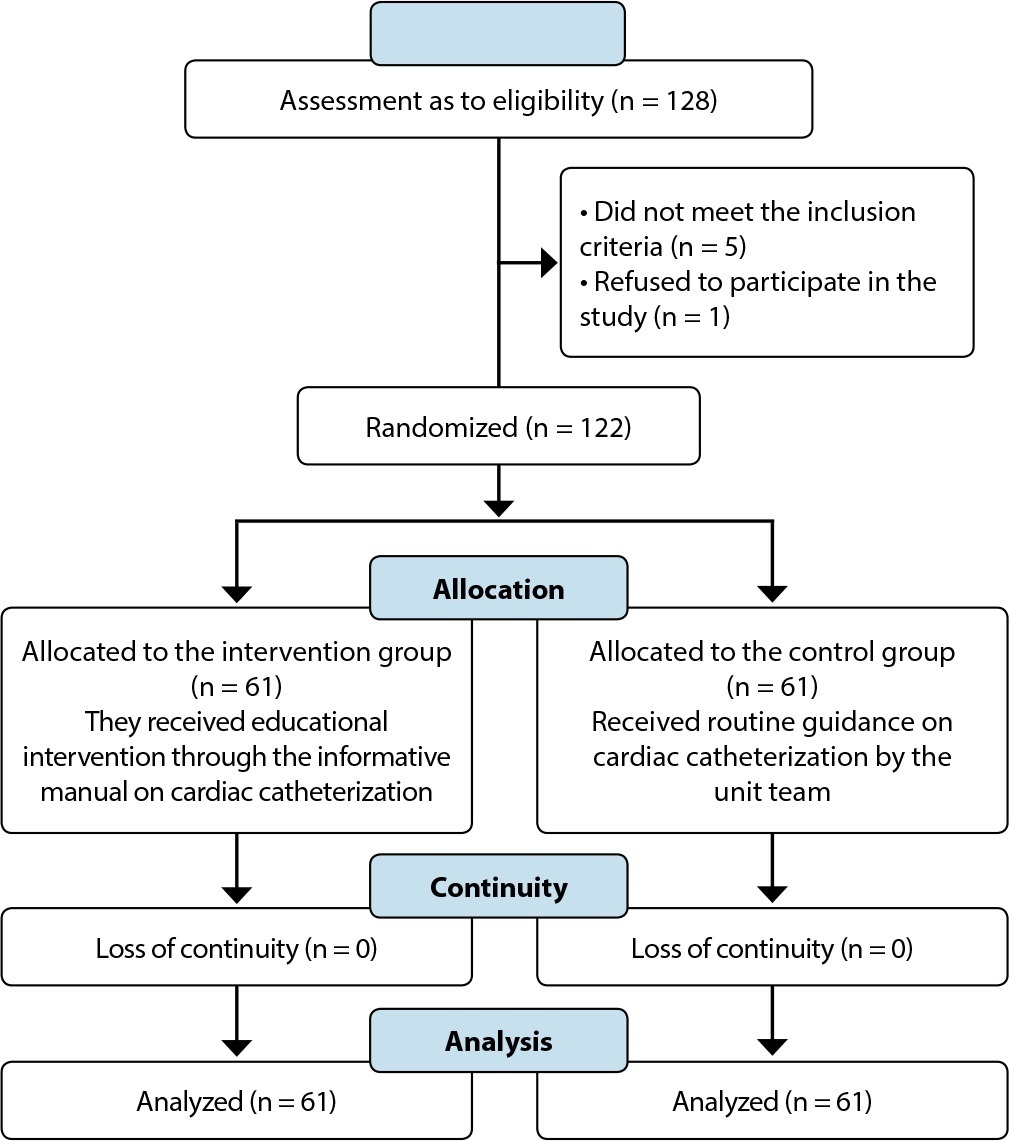-
REVIEW09-06-2022
Biosafety measures to prevent COVID-19 in healthcare professionals: an integrative review
Revista Brasileira de Enfermagem. 2022;75(1):e20201191
Abstract
REVIEWBiosafety measures to prevent COVID-19 in healthcare professionals: an integrative review
Revista Brasileira de Enfermagem. 2022;75(1):e20201191
DOI 10.1590/0034-7167-2020-1191
Views0See moreABSTRACT
Objective:
to identify the main biosafety measures for preventing COVID-19 in healthcare professionals.
Methods:
this is an integrative literature review, with studies published between January and July 2020, on the MEDLINE/PubMed, Scopus, Embase, Web of Science, LILACS, SciELo, Wiley Online Library, Cochrane CINAHL databases. The selection of studies followed the PRISMA recommendations.
Results:
among the 2,208 publications identified, 12 studies comprised the sample, which enabled the analysis in four thematic categories: The importance of using recommendations about the use of personal protective equipment; The restructuring of new operational and clinical routines and flows in the practice of services; Monitoring professionals, especially testing; Conducting training.
Conclusions:
the phenomena involved are innumerable, covering operational management and the training of teams to deal with highly infectious pathogens and disease outbreaks.

-
REVIEW09-06-2022
Prevention of hypothermia in newborn submitted to surgical procedures: an integrative review
Revista Brasileira de Enfermagem. 2022;75(1):e20200940
Abstract
REVIEWPrevention of hypothermia in newborn submitted to surgical procedures: an integrative review
Revista Brasileira de Enfermagem. 2022;75(1):e20200940
DOI 10.1590/0034-7167-2020-0940
Views0See moreABSTRACT
Objective:
to discuss in the scientific literature the strategies used to prevent hypothermia in newborns undergoing surgical procedures.
Methods
this is an integrative literature review, with structured search in April and May 2020 in 08 databases, using the descriptors: Hypothermia; Surgical Procedures, Operative; Infant, Newborn; Protocols. Four primary studies were selected and analyzed using three instruments to assess the methodological quality of the Joanna Briggs Institute and content analysis.
Results:
Among the strategies used, the following stand out: room temperature control; establishment of humidification and quality of air conditioning cleanliness; use of a heated incubator or cradle; use of thermal mattress; use of caps and blanket; heated fluids; temperature monitoring and abdominal organ coverage.
Conclusion
good hypothermia prevention strategies were identified, despite the small number of publications on this topic; thus, it points out the need for research with strong evidence.

-
ORIGINAL ARTICLE09-06-2022
(Lack of) knowledge of mothers about sickle cell trait and disease: a qualitative study
Revista Brasileira de Enfermagem. 2022;75(1):e20201217
Abstract
ORIGINAL ARTICLE(Lack of) knowledge of mothers about sickle cell trait and disease: a qualitative study
Revista Brasileira de Enfermagem. 2022;75(1):e20201217
DOI 10.1590/0034-7167-2020-1217
Views0See moreABSTRACT
Objective:
to analyze the understanding of mothers about sickle cell disease and/or trait of the family from a diagnosed child.
Methods:
this is a qualitative study, using a semi-structured interview with 23 mothers, at a sickle cell disease outpatient clinic of a public institution, from October to December 2017. Analysis was thematic.
Results:
all participants had sickle cell trait as well as the parents of their children. Twenty children were diagnosed with sickle cell disease by Heel Prick Test, and three, after hospitalization due to the disease. Most did not know how to report the presence of the trait or disease in relatives other than nuclear.
Final considerations:
diagnosis cannot be restricted to the result of neonatal screening, requiring that preventive information on sickle cell crises be reinforced. It is recommended to search for other affected relatives to learn about their genetic condition, reflecting on their reproductive decisions.
-
ORIGINAL ARTICLE09-06-2022
Evaluating the psychometric properties of the eHealth Literacy Scale in Brazilian adults
Revista Brasileira de Enfermagem. 2022;75(1):e20201320
Abstract
ORIGINAL ARTICLEEvaluating the psychometric properties of the eHealth Literacy Scale in Brazilian adults
Revista Brasileira de Enfermagem. 2022;75(1):e20201320
DOI 10.1590/0034-7167-2020-1320
Views0See moreABSTRACT
Objective:
To translate and adapt the eHealth Literacy Scale for the cultural reality of Brazil and to evaluate the psychometric properties of its Brazilian Portuguese version.
Methods:
The instrument was translated and adapted to Brazilian Portuguese and applied to a sample of 502 individuals from 18 to 80 years old who lived in the surrounding areas of six Family Health Units of a city in the countryside of the state of São Paulo, Brazil. The data was evaluated using exploratory and confirmatory factor analysis, item response theory, and instrument reliability measures (Cronbach’s alpha and McDonald’s omega).
Results:
The eHealth Literacy Scale – Brazilian version (eHEALS-Br) presented an excellent internal consistency (α = 0.95 e ω = 0.95), with only one dimension and an explained variation of 81.79%.
Conclusions:
The Brazilian version of the instrument showed excellent psychometric properties to measure the levels of digital health literacy in adults from the country.

-
ORIGINAL ARTICLE09-06-2022
Quality of life in people with coronary artery disease: translation and cross-cultural adaptation of a questionnaire
Revista Brasileira de Enfermagem. 2022;75(1):e20200647
Abstract
ORIGINAL ARTICLEQuality of life in people with coronary artery disease: translation and cross-cultural adaptation of a questionnaire
Revista Brasileira de Enfermagem. 2022;75(1):e20200647
DOI 10.1590/0034-7167-2020-0647
Views0See moreABSTRACT
Objective:
to carry out translation, cross-cultural adaptation to Portuguese and assess the reliability of the four versions of the Coronary Revascularization Outcome Questionnaire – adapted.
Methods:
a methodological study of translation and cross-cultural adaptation into Portuguese, as proposed by Beaton et al., and reliability analysis, by calculating Cronbach’s alpha coefficient and item-total correlation of the four versions of the Coronary Revascularization Outcome Questionnaire – adapted.
Results:
the adaptations made facilitated the understanding of the items. All domains had Cronbach’s alpha above 0.70, except two in the post-percutaneous coronary intervention version and two in the post-myocardial surgical revascularization version. All items had item-total correlation values greater than 0.20, except two in the post-percutaneous coronary intervention version, one in the pre-coronary intervention version and six in the post-myocardial surgical revascularization version.
Conclusion:
the cross-cultural adaptation to Portuguese was considered satisfactory. Pre-procedure versions were considered reliable, while the post-procedures require other psychometric analyses.
-
ORIGINAL ARTICLE09-05-2022
Effectiveness of educational intervention with manual for anxiety and stress reduction: controlled clinical trial
Revista Brasileira de Enfermagem. 2022;75:e20210757
Abstract
ORIGINAL ARTICLEEffectiveness of educational intervention with manual for anxiety and stress reduction: controlled clinical trial
Revista Brasileira de Enfermagem. 2022;75:e20210757
DOI 10.1590/0034-7167-2021-0757
Views0See moreABSTRACT
Objective:
To evaluate the effectiveness of the educational intervention through an informative manual in reducing anxiety, stress, and changes in vital signs in patients awaiting cardiac catheterization.
Methods:
Parallel, randomized, controlled, blind clinical trial. The study excluded patients waiting for cardiac catheterization; those who received the information manual were randomized to the intervention group, and those who received routine information from the unit went to the control group. The study used the State Anxiety Inventory and Perceived Stress Scale and the ANOVA test to analyze the outcomes between the groups. Clinical Trials .
Results:
There was no change concerning time, first and second moment (anxiety, P=0.225; and stress, P=0.696), interaction (anxiety, P=0.183; and stress, P=0.444), or groups, control, and intervention (anxiety, P=0.341; and stress, p=0.624).
Conclusion:
Although the educational intervention performed did not have an impact on the reduction of anxiety and stress, this type of intervention should be maintained for greater comfort and safety of patients and family members.

-
ORIGINAL ARTICLE09-05-2022
Spirituality and religiosity expressed by relatives of drug users: contributions to health care
Revista Brasileira de Enfermagem. 2022;75:e20210724
Abstract
ORIGINAL ARTICLESpirituality and religiosity expressed by relatives of drug users: contributions to health care
Revista Brasileira de Enfermagem. 2022;75:e20210724
DOI 10.1590/0034-7167-2021-0724
Views0See moreABSTRACT
Objective:
to analyze the expressions of spirituality and religiosity of relatives of people who abuse or are dependent on psychoactive substances.
Methods:
exploratory-descriptive research that dialogues with the spirituality and religiosity conceptual framework. It was performed at an outpatient clinic specialized in drug treatment in southern Brazil. Semi-structured interviews conducted with 11 relatives of patients undergoing treatment were analyzed by content analysis.
Results:
the findings were grouped into two categories: forms of expression of spirituality and religiosity practices; and their influence on relatives’ lives. Spirituality and religiosity almost always serve as a protective factor against feelings of anguish, conflicts and loneliness.
Final considerations:
despite the important role of expressions of spirituality and religiosity for many relatives, not everyone seems to benefit from them. Health professionals should consider these expressions in the construction of comprehensive health care for relatives.
-
ORIGINAL ARTICLE09-05-2022
Screening for common mental disorder in elderly residents in the countryside: a cross-sectional study
Revista Brasileira de Enfermagem. 2022;75:e20210875
Abstract
ORIGINAL ARTICLEScreening for common mental disorder in elderly residents in the countryside: a cross-sectional study
Revista Brasileira de Enfermagem. 2022;75:e20210875
DOI 10.1590/0034-7167-2021-0875
Views0See moreABSTRACT
Objective:
To estimate the prevalence of common mental disorders and their associated factors in the elderly in a municipality in the countryside of the Brazilian Midwest.
Methods:
Quantitative, observational, cross-sectional approach research, conducted with 218 elderly people.
Results:
The prevalence of the common mental disorder among the elderly was 25.1%; in the univariate analysis, it was higher in females (35.4%), in the age group of 80 years or older (46.1%), brown skin color (30.2%), widowed (42.6%), illiterate (47.6%), and retired (27.6%). In the multiple analysis, the variables female gender (p<0.006), age 80 years or older (p<0.036), dissatisfaction with life (p<0.009), lack of social interaction (p=0.017), and dysfunctional family (p=0.021) remained associated with CMD.
Conclusion:
The results revealed are helpful and contribute to the reinforcement of the need for mental health care in this population extract so growing worldwide.
-
ORIGINAL ARTICLE05-15-2020
Stress and quality of sleep in undergraduate nursing students
Revista Brasileira de Enfermagem. 2020;73:e20180227
Abstract
ORIGINAL ARTICLEStress and quality of sleep in undergraduate nursing students
Revista Brasileira de Enfermagem. 2020;73:e20180227
DOI 10.1590/0034-7167-2018-0227
Views0See moreABSTRACT
Objective:
to analyze the level of stress and sleep quality in nursing students according to terms of the nursing program.
Method:
descriptive and cross-sectional research developed in a higher education institution in Northeastern Brazil on 167 students. We used data collection, sociodemographic information, and a scale for assessing stress and sleep quality in nursing students.
Results:
we identified a statistically significant difference between domains of the stress scale and the terms of the undergraduate program, and between the quality of sleep and such terms such as as in the fourth and sixth semesters.
Conclusion:
different stress scores show that the semester which concerns students the most is the fifth. Quality of sleep was deemed good for the first, third, fifth, seventh, and eighth semesters; and poor for the fourth and sixth terms.
-
ORIGINAL ARTICLE09-21-2020
Clinical judgment and diagnostic reasoning of nursing students in clinical simulation
Revista Brasileira de Enfermagem. 2020;73(6):e20180878
Abstract
ORIGINAL ARTICLEClinical judgment and diagnostic reasoning of nursing students in clinical simulation
Revista Brasileira de Enfermagem. 2020;73(6):e20180878
DOI 10.1590/0034-7167-2018-0878
Views0See moreABSTRACT
Objectives:
to determine the degree of association between clinical judgment and diagnostic reasoning of nursing students in clinical simulation.
Methods:
this is a correlational research design using a quantitative approach. The sample consisted of 41 nursing students who assisted a patient with vaso-occlusive crisis in a high-fidelity clinical simulation setting. The instruments used included the Lasater Clinical Judgment Rubric – Brazilian Version and the Diagnostic Thinking Inventory.
Results:
clinical judgment was associated with diagnostic reasoning (r=0.313; p=0.046), as well as the “noticing” aspect of clinical judgment with diagnostic reasoning (r=0.312; p=0.047).
Conclusions:
the results show that skills to interpret patient data are associated with diagnostic reasoning skills. Teaching clinical judgment skills is necessary to develop the diagnostic reasoning of nursing students.
-
ORIGINAL ARTICLE12-05-2019
Quality of life of institutionalized aged with and without symptoms of depression
Revista Brasileira de Enfermagem. 2019;72:127-133
Abstract
ORIGINAL ARTICLEQuality of life of institutionalized aged with and without symptoms of depression
Revista Brasileira de Enfermagem. 2019;72:127-133
DOI 10.1590/0034-7167-2018-0316
Views0See moreABSTRACT
Objective:
compare the quality of life (QOL) of aged residents in homes for aged people with or without symptoms of depression, and identify social, physical activity; leisure; health and basic activities of daily living (ADL) variables that correlate with QOL scores.
Method:
cross-sectional study conducted with 101 institutionalized aged. Multiple linear regression was used for data analysis.
Results:
symptoms of depression changed negatively the QOL in the domains: autonomy; present, past and future activities; social participation; intimacy and total score. Dependent aged presented lower QOL for the performance of ADL in the domains: autonomy; social participation and total score; dancing without limitation of movement; liking the residential and not presenting symptoms of depression were the variables that positively influenced the QOL of the aged.
Conclusion:
social and psychological support, good living conditions and stimulating assistance can improve the QOL of institutionalized elderlies.
-
ORIGINAL ARTICLE07-08-2020
Spirituality and religiousity in the experience of suffering, guilt, and death of the elderly with cancer
Revista Brasileira de Enfermagem. 2020;73:e20190034
Abstract
ORIGINAL ARTICLESpirituality and religiousity in the experience of suffering, guilt, and death of the elderly with cancer
Revista Brasileira de Enfermagem. 2020;73:e20190034
DOI 10.1590/0034-7167-2019-0034
Views0See moreABSTRACT
Objective:
to understand spirituality and religiosity in the experience of suffering, guilt, and death of the elderly with cancer.
Method:
qualitative research based on Viktor Frankl’s Existential Analysis. Twenty phenomenological interviews were conducted with people over 60 years old undergoing chemotherapy treatment at an oncology unit of a hospital in the city of Salvador, Bahia State, Brazil, between August and October 2018.
Results:
the following categories emerged: Experiences spirituality and religiosity in the face of the tragic triad and existential emptiness; Uses spirituality/religiosity as resilience strategies. After apprehension of ontic aspects, it was possible the ontological understanding of spirituality and religiosity in the face of suffering, guilt, and death experienced in the elderly with cancer’s daily life.
Final considerations:
spirituality and religiosity were understood as coping strategies used in the unstable experience of the elderly with cancer, providing comfort and resilience.
-
ORIGINAL ARTICLE02-10-2020
Mental health profile of the elderly community: a cross-sectional study
Revista Brasileira de Enfermagem. 2020;73(1):e20180191
Abstract
ORIGINAL ARTICLEMental health profile of the elderly community: a cross-sectional study
Revista Brasileira de Enfermagem. 2020;73(1):e20180191
DOI 10.1590/0034-7167-2018-0191
Views0See moreABSTRACT
Objective:
to describe the mental health profile of the elderly registered in a Family Health Unit in the city of Recife, Pernambuco State.
Method:
it was a descriptive quantitative study, conducted with 159 elderly through the scales Geriatric Depression, Resilience, Social Support, Life Satisfaction, and Positive and Negative Affects, Mini-Mental State Examination, Stressful Events Inventory and Brazil Old Age Shedule.
Results:
females, young and literate elderly predominated. Most were satisfied with life, 52.2% without depressive symptoms, 68.6% without cognitive impairment, 67.9% high resilience and 95.8% high social support, but 62% of elderly with depressive symptoms showed cognitive deficit. Negative correlation was identified between depression and cognitive impairment, resilience, social support and life satisfaction.
Conclusion:
assessment of these indicators identifies triggers of psychological distress, assisting the nursing staff in the development of preventive and care actions.
-
EXPERIENCE REPORT10-26-2020
Collaborative practices from health care teams to face the covid-19 pandemic
Revista Brasileira de Enfermagem. 2020;73:e20200470
Abstract
EXPERIENCE REPORTCollaborative practices from health care teams to face the covid-19 pandemic
Revista Brasileira de Enfermagem. 2020;73:e20200470
DOI 10.1590/0034-7167-2020-0470
Views0See moreABSTRACT
Objective:
To report the experience of collaborative practices facing the COVID-19 pandemic.
Methods:
This is a report about the experience of collaborative practices conducted by health care teams in emergency service in the Emergency Care Units facing of COVID-19 pandemic in the city of Fortaleza, State of Ceará, in the first semester of 2020.
Results:
Collaborative actions, cooperation and effective communication among nursing and medical team contribute to the management of mild and complex cases of COVID-19, as well as qualify them in suitable and necessary care and confrontation measures.
Final considerations:
The report shows the need for collaborative practices to minimize negative effects on the population in the face of the new coronavirus pandemic.

-
ORIGINAL ARTICLE11-25-2020
Family experiences in discovering Autism Spectrum Disorder: implications for family nursing
Revista Brasileira de Enfermagem. 2020;73:e20190489
Abstract
ORIGINAL ARTICLEFamily experiences in discovering Autism Spectrum Disorder: implications for family nursing
Revista Brasileira de Enfermagem. 2020;73:e20190489
DOI 10.1590/0034-7167-2019-0489
Views0See moreabstract
Objectives:
to describe the family’s experience in the process of discovering the diagnosis and initiation of treatment of children with Autism Spectrum Disorder.
Methods:
this qualitative and descriptive study interviewed nine relatives of eight children on autism spectrum. They were inserted in health services, public education, and Association of Parents and Friends of The Exceptional of cities in the countryside of the Center-West. Data were collected through open interviews from July to September 2017. Data was submitted to thematic analysis.
Results:
at the beginning, the family was difficult to perceive the first atypical signs presented by the children. Families experience situations of vulnerability, since support networks are insufficient. The school played a significant role in recognizing unexpected behaviors.
Final Considerations:
support, offered by nurses, health professionals, school and social support devices, is important to family and children in this trajectory.
-
ORIGINAL ARTICLE10-21-2019
Nurses defending the autonomy of the elderly at the end of life
Revista Brasileira de Enfermagem. 2019;72(6):1639-1645
Abstract
ORIGINAL ARTICLENurses defending the autonomy of the elderly at the end of life
Revista Brasileira de Enfermagem. 2019;72(6):1639-1645
DOI 10.1590/0034-7167-2018-0768
Views1See moreABSTRACT
Objective:
to understand how nurses deal with the elderly’s autonomy at the end of life.
Method:
qualitative, exploratory study, guided by the Grounded Theory. Ten nurses, eight doctors and 15 nursing technicians were interviewed between November 2016 and May 2017 at a university hospital in Rio de Janeiro/Brazil.
Results:
nurses deal with the elderly’s autonomy in compliance with the code of ethics and exercise leadership in actions and interactions to defend this right, evaluating, guiding and listening to the preferences of the elderly; interacting with the family; and sharing information with the health team.
Final considerations:
the elderly’s autonomy must be ensured in care planning, based on patient-centered communication and developed in the interaction among agents involved in care. The discussion on “Living Wills” Health Care Directives and principles of palliative care must be encouraged.
Search
Search in:
Nuvem de Tags
Adolescente (85) Atenção Primária à Saúde (239) COVID-19 (91) Criança (91) Cuidados de Enfermagem (269) Educação em Enfermagem (151) Educação em Saúde (139) Enfermagem (930) Enfermagem Pediátrica (86) Estudantes de Enfermagem (77) Estudos de Validação (131) Família (87) Idoso (208) Promoção da Saúde (99) Qualidade de Vida (104) Saúde do Trabalhador (86) Saúde Mental (145) Saúde Pública (82) Segurança do Paciente (150) Tecnologia Educacional (100)



